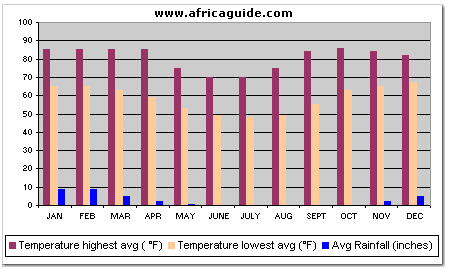Malawi Visitor Information
Parent page
On this page
The variable altitude of Malawi provides wide differences in climate. The lowest point is where the Shire Valley approaches its confluence with the Zambezi River, at about 100 ft above sea level. The vast water surface of Lake Malawi also profoundly affects the climate. The margins of the lake have long hot seasons and high humidity, with mean annual temperatures of 24°C (75°F). The temperature generally decreases and the rainfall increases with altitude. Malawi is noted for its rapid transitions from low to high rainfall. Trade winds and cool maritime air bring clouds and drizzly rain to the mountains in the east which rise to over 1,830 m (6,000 ft). The tea belt profits from both winter and summer rains, and the high plateau area offers opportunities for afforestation because of heavy rainfall. Winters are cool, with occasional spells of cold weather.
In general, the seasons may be divided into the cool (May to mid-August); the hot (mid August to November); the rainy (November to April), with rains continuing longer in the northern and eastern mountains, and the post-rainy (April-May), with temperatures falling in May. Zomba has extreme temperatures of 35°C and 7°C (95°F and 45°F) and considerable rainfall. Lilongwe, in central Malawi, at an elevation of 1,036 (3,400 ft) has a moderately warm climate with adequate rainfall and extreme temperatures of 36°C and -3.4°C (97°F and 26°F)
The ultra-violet rays are very strong in Malawi and burn times very short - great care should be taken
A valid passport, with at least six months to expiry date from intended exit date, is required to enter Malawi. If your passport is likely to expire you should get a new one before arriving. Visas are not obtainable at points of entry must be organised prior to travelling through the nearest Malawian Embassy or High Commission. Visa are required by all but the following passport holders: Bahamas, Bangladesh, Barbados, Belgium, Botswana, Brunei, Canada, Cyprus, Denmark, Fiji, Finland, Gambia, Germany, Ghana, Grenada, Iceland, Israel, Ireland, Jamaica, Kenya, Lesotho, Luxembourg, Malaysia, Malta, Mauritius, Netherlands, New Zealand, Nigeria, Norway, Portugal, San Marino, Sierra Leone, Singapore, South Africa, Sri Lanka, Swaziland, Sweden, Trinidad and Tobago, UK, USA, Zambia, Zimbabwe.
Malawi has diplomatic representation in Belgium (Brussels), Canada (Ontario) France (Paris) Germany (Bonn), Japan (Tokyo), Kenya (Nairobi), Mozambique (Maputo), Namibia (Windhoek) South Africa (Pretoria), UK (London), USA (Washington), Zambia (Lusaka) and Zimbabwe (Harare). Visitors passes are required by all foreign passport holders and these can be obtained, free of charge, at the point of entry. Visitor's passes are valid for 1 month and can easily be extended, up to a maximum of 90 days, at any of the immigration offices which can be found in most major towns.
It is best to ensure that you have an outward bound ticket or can show sufficient funds to support your stay in the country.
Malawian Tourist offices and/or embassy locations around the world
Currency: 1 Malawian Kwacha = 100 tambala
Current Exchange Rate: Today's Exchange Rate
Credit and charge cards are accepted, in hotels and banks.
Travellers cheques are widely accepted and exchanged.
It's best to take some hard currency in either GB Pounds or US Dollar, South African Rand is also widely exchanged.
Air
Internal Flights
Internal air connections can be made from Lilongwe to Blantyre, Koronga, Mzuzu and Club Makokola on the southern Lakeshore with Air Malawi.
Lake Ferry
Two ferries, the MV Ilala and MV Mtendere, travel between Monkey Bay and Chilumba once a week. The ferries are inexpensive but are not up to tourist standards. The Ilala is the better of the two.
Railways / Train Services
Services by rail are slow, overcrowded and erratic, they offer no advantages over road travel and are therefore not used by tourists. The rail connects Lilongwe to Blantyre via Salima and Blantyre to Nsanje near the border where it extends into Mozambique to Biera. It is possible that this route may now be developed in the near future.
More Info - click here Central East African Railways Company Ltd.
Bus
Bus services are available throughout Malawi. There is a luxury bus service three times daily between Blantyre and Lilongwe and three times weekly between Blantyre and Mzuzu by the main bus operator in Malawi, Stagecoach. They cover many roads in Malawi and are rarely overcrowded. Travelling by bus is the most cost effective and reliable way to get around.
On many roads in Malawi, especially where there is no public transport, bus services are supplemented by the motola system. Generally they are no cheaper than buses but you will reach your destination quicker. These are not regarded as a safe form of transport with many of the vehicles being in poor order and often driven by drunks.
Hitching
The lakeshore road and the M1 between Blantyre and Lilongwe are the best roads for hitching, many of the lifts you will be offered will expect payment and sometimes you may have no other option.
Road
You will need a valid international driving licence or national driving licence if set out in English. Malawi drives on the left. The main roads is Malawi are generally surfaced and most are reasonably well maintained. Many smaller roads and roads within the game reserves can become impassable in the rainy season. Be aware, for some reason, Malawian drivers seem to believe that by not using their headlights will conserve the life of their car battery, so driving after dark can be dangerous.
Hiring a car is an expensive way to get around but essential if you want to see a lot in a limited time.
January 1st - New Years Day
January 16th - John Chilembwe Day
March 3rd - Martyrs Day
March/April - Good Friday & Easter Monday
May 1st - Labour Day
June 14th - Freedom Day
July 6th - Republic Day
2nd Monday in October - Mothers Day
2nd Monday in December - National Tree Planting Day
December 25th - Christmas Day
December 26th - Boxing Day
Electric Power is 230V running at 50Hz.
The Plug type used in Malawi is: "Type G" British BS-1363
Rectangular blade plug.









